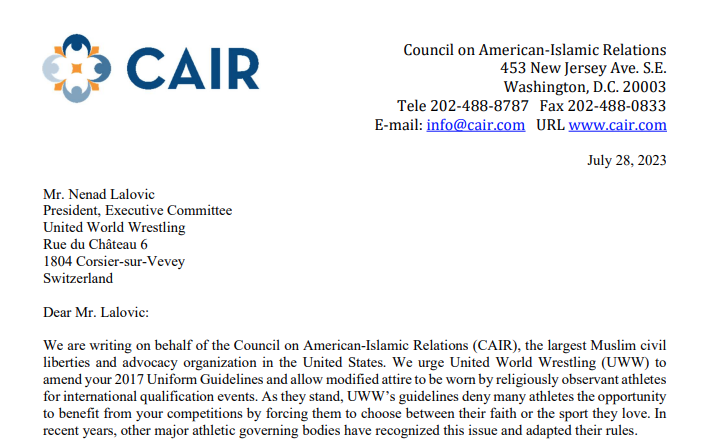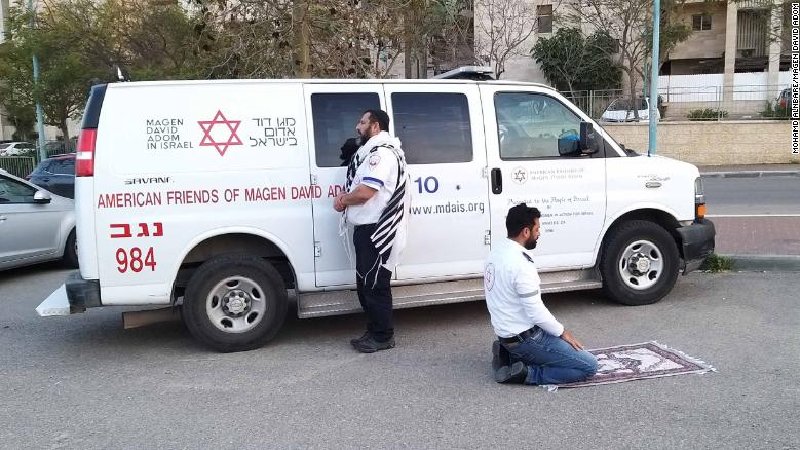
-
HOME
-
WHAT IS STANDOur Mission Our Values Our Help Contact
-
WHAT WE FIGHT FORReligious Freedom Religious Literacy Equality & Human Rights Inclusion & Respect Free Speech Responsible Journalism Corporate Accountability
-
RESOURCESExpert Studies Landmark Decisions White Papers FAQs David Miscavige Religious Freedom Resource Center Freedom of Religion & Human Rights Topic Index Priest-Penitent Privilege Islamophobia
-
HATE MONITORBiased Media Propagandists Hatemongers False Experts Hate Monitor Blog
-
NEWSROOMNews Media Watch Videos Blog
-
TAKE ACTIONCombat Hate & Discrimination Champion Freedom of Religion Demand Accountability
Council on American-Islamic Relations Calls Out UWW on Discriminatory Uniform Guidelines
In a letter to United World Wrestling (UWW) president Nenad Lalovic, the Council on American-Islamic Relations (CAIR) called on the UWW to amend its 2017 Uniform Guidelines to allow religiously observant athletes to wear modified attire.

The July 28 letter—signed by CAIR Deputy Executive Director Edward Ahmed Mitchell, Esq. and the Executive Director of CAIR’s Georgia chapter, Murtaza Khwaja—says, “As they stand, UWW’s guidelines deny many athletes the opportunity to benefit from your competitions by forcing them to choose between their faith or the sport they love.”
CAIR cited an incident this past April when three Muslim women were banned from international wrestling competitions and forced to forfeit their wins because the UWW’s regulations “would have violated their sincerely held Islamic beliefs to dress modestly.”
“Provisions against attire modifications disproportionately affect marginalized communities. In the U.S., this has often meant Muslims and Sikhs.”
The UWW is the international governing body for amateur wrestling, presiding over global competitions such as the Olympics and World Wrestling Championships. As such, it has the last word on who can or cannot participate on the international wrestling stage.
Although the USA Wrestling Association, Inc., America’s official representative at the UWW, modified their guidelines to allow the female athletes to wear more modest uniforms, including a “hood-like head cover” in respect of their religious beliefs, athletes are not permitted into international competitions if their uniforms do not comply with 2017 guidelines from UWW.
Mr. Mitchell and Khwaja urged the UWW to follow the example of other sports associations in supporting a more inclusive approach, writing, “Many international athletic organizations have already modified their rules and policies to ensure that people of faith can participate in the sport. For example, over the past few years, the International Basketball Federation (FIBA), the International Weightlifting Federation (IWF) and the International Federation of Association Football (FIFA) have all lifted their respective bans on religious headgears, including hijabs. In part, this is because they have found that such clothing does not impact an athlete’s ability to compete. Also in part is the recognition that provisions against attire modifications disproportionately affect marginalized communities. In the U.S., this has often meant Muslims and Sikhs.”
The letter concludes with an appeal to the UWW to make their guidelines more inclusive. “Doing so would reflect a trend of policy changes among athletic governing bodies and demonstrate that international wrestling is a sport for everyone.”
STAND joins CAIR in its call for equal rights and equal participation for members of every faith.






